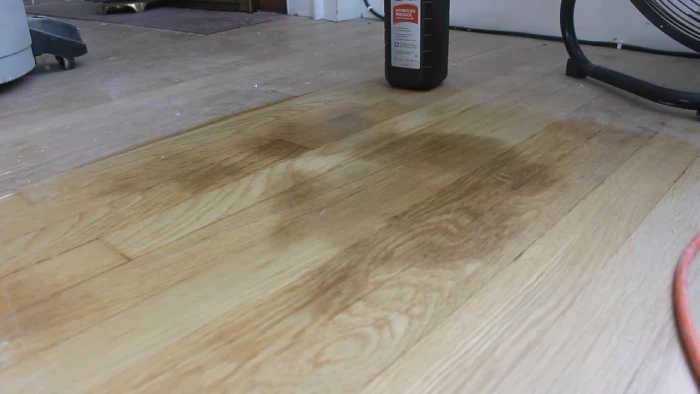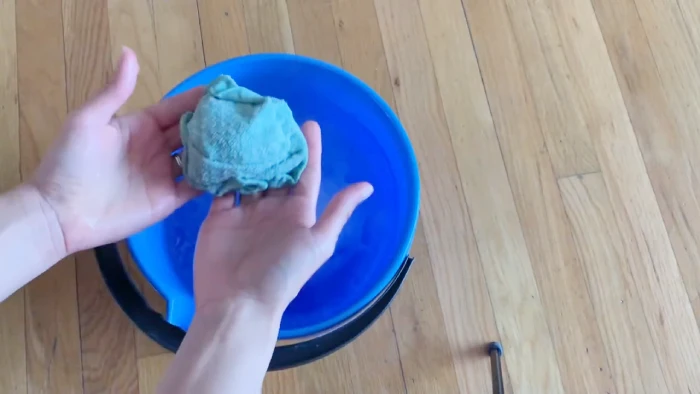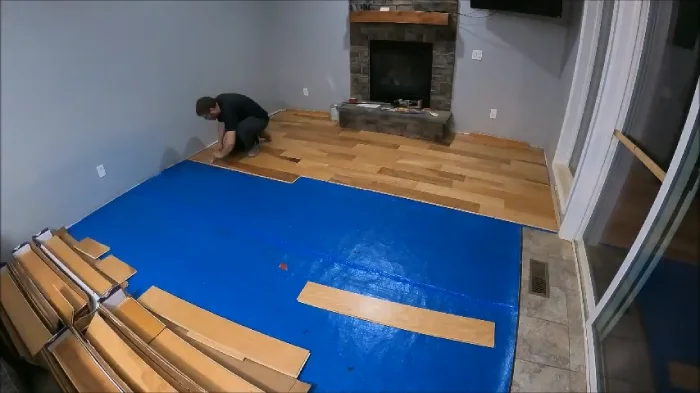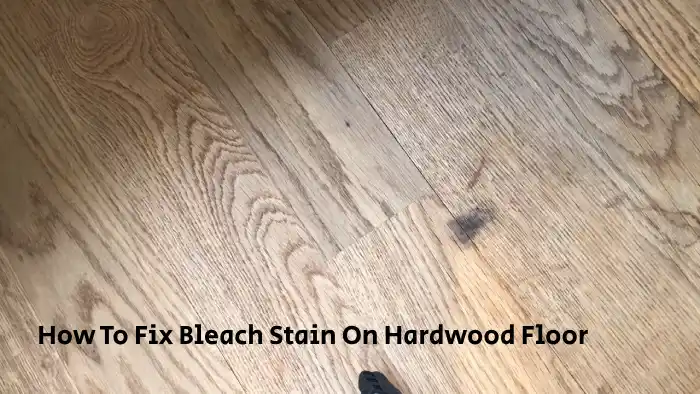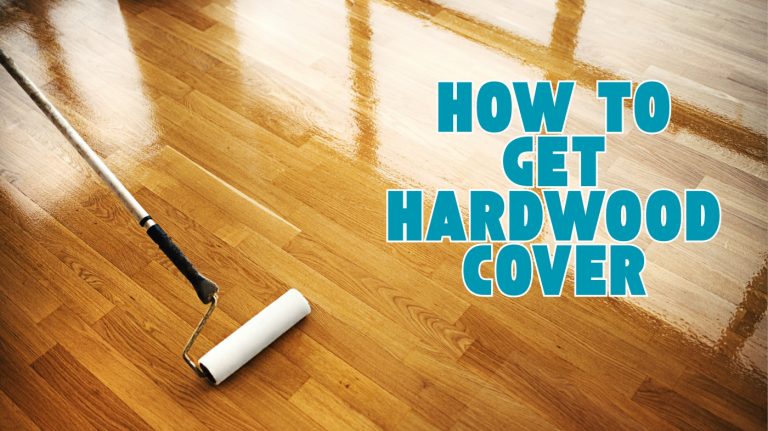How to Clean Cat Urine From Hardwood Floor: 6 Steps [DIY]
Cat urine on hardwood floors can be a complex problem to deal with. Not only is it unpleasant to smell, but it can also damage the flooring if left untreated. The acidity of the cat urine can eat away at the finish and seep into the wood, causing discoloration and even warping.
But you can easily clean cat urine off hardwood floors. All you need to do is clean the area by spot cleaning, applying cleaning agents, and wiping and rinsing it.
One important thing to note before we begin is that prompt action is crucial when dealing with cat urine on hardwood floors. The longer you wait, the more time the urine has to soak into the wood and cause damage.
Thus you must act quickly and remove as much urine as possible before applying any cleaning solutions or treatments. Let’s dive into some effective methods for cleaning cat urine from your hardwood floors.
How to Clean Cat Urine from Hardwood Floors – Easy Guides
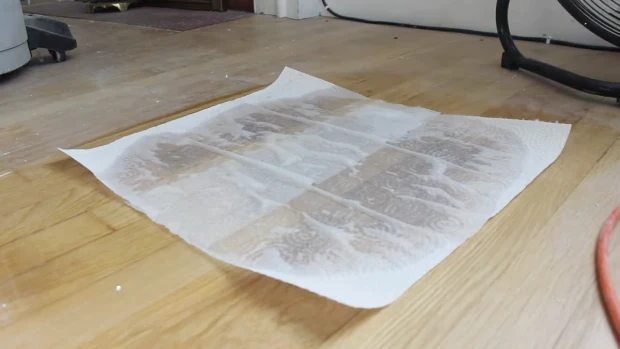
To begin the cleaning process, you need to follow these steps carefully:
Equipment and Materials Needed
For cleaning cat urine from hardwood floors, there are several items that you will need to do the job right. These include:
- Sponges (5) can absorb the excess urine before it can soak into the wood.
- A clean bucket for mixing up your cleaning solution and rinsing your sponge as needed.
- A scrub brush with nylon bristles for gently working the cleaning solution into any stubborn areas where urine has soaked in deeply.
- Liquid enzyme-based pet odor remover is specially formulated to break down and eliminate urine stains and odors at their source.
- Disposable cloth rags are ideal for wiping up any remaining moisture after cleaning so that no water is left behind on your hardwood floor.
- Disposable latex or nitrile gloves that protect against bacteria and other contaminants while keeping your hands dry during this process.
Step 1. Spot-Clean the Area
To spot-clean the area, use paper towels or an old rag to blot up as much of the urine as possible. Be gentle so you do not further spread the stain or damage the wood. Empty the litter box right away if there’s urine.
Step 2. Dispose of Cleaning Supplies
Disposing of any paper towels or rags used for blotting up excess urine immediately after use is recommended. These items should be placed in a plastic bag and sealed tightly before being thrown away.
Next, dispose of the sponge used previously and thoroughly clean out the bucket. This step will ensure no lingering traces of cat urine or cleaning solution left behind that could cause recontamination if not properly disposed of or cleaned up.
Properly disposing of all cleaning supplies also helps prevent any potential safety hazards, such as accidental ingestion by pets or children.
Step 3. Apply the Cleaning Product
Simply spray the cleaning product onto the affected area and let it stay for several minutes. Be sure to follow specific instructions on the product label regarding the application and cleanup of cat litter, urine, vomit, or other messes.
When cleaning cat urine from a hardwood floor, choosing an effective cleaning product containing enzymes or bacteria that can break down and neutralize the odor-causing compounds in cat urine is important.
Also, the odor-removing product should be sprayed directly onto the affected location to eliminate the malodorous problem area. These products are available in most pet stores or online retailers.
Step 4. Let it Soak
After applying the cleaning product, let it soak for several minutes. Depending on the specific cleaning product used, a brief soaking period may be required to effectively neutralize the urine odor-causing compounds in cat urine.
This is particularly important when cleaning hardwood floors, as the porous nature of wood can make it difficult to remove all traces of urine completely. If not properly soaked, residual odors may continue attracting cats to the same spot and encourage them to urinate again.
Step 5. Wipe and Rinse the Area
After allowing the cleaning product to soak, the next step is wiping and rinsing the affected area with clean water to remove residual odor-causing compounds.
Use a new sponge or rag to wipe up the urine from the hardwood floor. Ensure to avoid using a dirty or previously used cloth as this may spread bacteria and germs onto other surfaces in your home.
Once you have wiped up all of the urine, lightly rinse off the area with clean, warm water. Avoid pooling water on the wood, as this can lead to further damage or discoloration. Instead, use a sprayer to lightly spritz the wood and then wipe it down with a clean cloth.
Step 6. Dry the Clean Area
The next step in the process involves thoroughly drying the previously treated area with another clean cloth to prevent any potential damage or discoloration.
This is particularly important for hardwood floors, as excessive moisture can cause warping or swelling of the wood. Use a dry cloth or towel and gently blot the area until completely dry.
It’s also essential to ensure the room is well-ventilated during this process, as stagnant air can prolong the drying time and potentially cause mildew growth. In some cases, it may be necessary to use a fan or dehumidifier to speed up the drying process.
What Cleaning Solution Can I Use to Clean Cat Urine from Hardwood Floors?
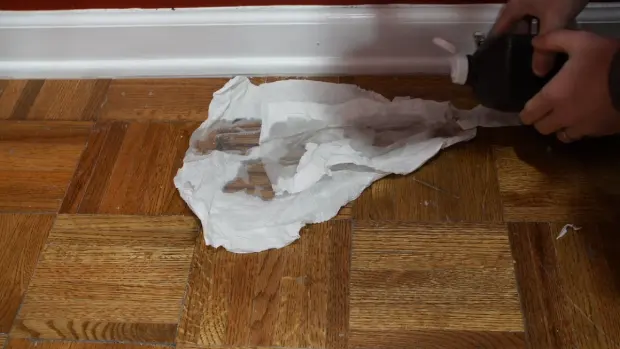
When cleaning cat urine from your wooden floor, there are several cleaning solutions you can use:
#1 White Vinegar and Grapefruit Oil
An acidic liquid paired with a citrus-scented oil was recommended to eliminate unpleasant smells and staining in a residential environment. The first step is to mix one cup of white vinegar into a hot water-filled bucket.
White vinegar is known for its acidity, making it an excellent cleaning agent that can break down urine stains and neutralize odors. Its acidic properties help to dissolve any leftover residue from the urine, making it easier to remove.
Next, add some drops of grapefruit oil to the solution. Grapefruit oil has natural antibacterial properties that can kill germs and bacteria associated with cat urine. It also gives off a fresh citrus scent that can help eliminate any lingering odor from the hardwood floor.
Using this safe cleaning solution, scrub the floor, concentrating on the most noticeable spots. As you scrub, the stains and odor should disappear.
Here are some key benefits of using white vinegar and grapefruit oil as a cleaning solution:
- Eco-friendly: Unlike chemical-based cleaners, this solution consists of natural ingredients that are less harmful to your health and the environment.
- Cost-effective: Both white vinegar and grapefruit oil are affordable products in most grocery stores or online shops.
- Safe for pets: This solution does not contain any toxic chemicals that could harm your pets when they come in contact with it.
#2 Hydrogen Peroxide
Removing deep stains and odors from floors may require hydrogen peroxide, which can effectively break down residue and neutralize unpleasant scents.
To start with, one should scrub the cat urine spots with a peroxide-soaked cloth before letting them dry. However, if the odor and stains are not thoroughly removed, cover each blemished spot with a paper towel saturated with hydrogen peroxide.
The next step is to leave this towel on each spot for several hours while checking repeatedly every hour to see if the stain comes out.
Once the stain has been removed, it is important to note that your floor color will likely show mild discoloration due to the cleaning process. Therefore, refinishing may be necessary to restore your hardwood floor’s original appearance.
#3 Baking Soda
Breaking down pet stains and neutralizing unpleasant odors can be achieved by utilizing baking soda, which can also deodorize and soak up any remaining dampness or residue. This natural cleaning method is particularly effective for removing cat urine from hardwood floors.
Here are the steps to follow:
Step 1: Blot the area with a paper towel to soak up any urine as possible.
Step 2: Sprinkle a thick layer of baking soda over the affected area.
Step 3: Let it sit for at least an hour (or overnight for tougher stains).
Step 4: Vacuum up the baking soda.
Baking soda is an effective household cleaning agent because it absorbs odors and moisture. It is a safe and affordable alternative that does not contain harmful chemicals like many commercial cleaning products.
#4 Enzymatic Cleaner
Enzymatic cleaners are highly effective in breaking down tough urine stains and unpleasant odors caused by organic matter through natural enzymes. These cleaners are particularly useful for cleaning cat urine from hardwood floors since they can penetrate deep into the wood to neutralize the odor at its source.
These cleaners break down the proteins in cat urine, eliminating the odor completely rather than just masking it. To use an enzymatic cleaner on a hardwood floor that has been soiled with cat urine, first remove any excess liquid with paper towels or a cloth.
Then, apply the enzymatic cleaner directly to the soiled area according to manufacturer instructions and allow it to sit for several minutes. The cleaner should be left undisturbed for some time as it works to break down and eliminate all traces of urine.
Once complete, rinse any excess cleaner with warm water and dry thoroughly with a clean towel.
Does Cat pee ruin my hardwood floors?
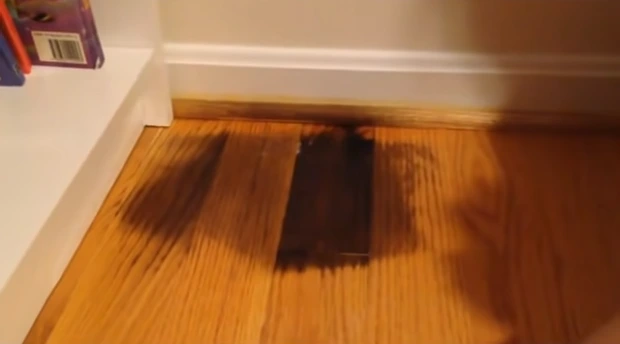
The damaging effects of feline excrement on hardwood surfaces can be highly distressing for homeowners. Cat urine contains ammonia, which can cause discoloration and warping of the wood. If left untreated, the urine can seep into the floorboards and cause permanent damage.
Furthermore, cat urine has a strong odor that can linger long after it has been cleaned up. This is because the uric acid found in cat urine is difficult to remove with traditional cleaning methods.
The longer the urine sits on the hardwood floor, the more likely it becomes deeply embedded in the wood fibers and emits an unpleasant smell.
What is the best cleaner for Cat urine on wood floors?
When looking for an effective cleaning solution to address feline excrement on wooden surfaces, opting for a vinegar-based cleaner is recommended.
White vinegar works by neutralizing the ammonia in cat urine, which helps to eliminate the odor and prevent further damage to the hardwood floor. Also, white vinegar is a natural deodorizer that can leave your hardwood floor smelling fresh and clean.
Does Cat pee soak into the hardwood floor?
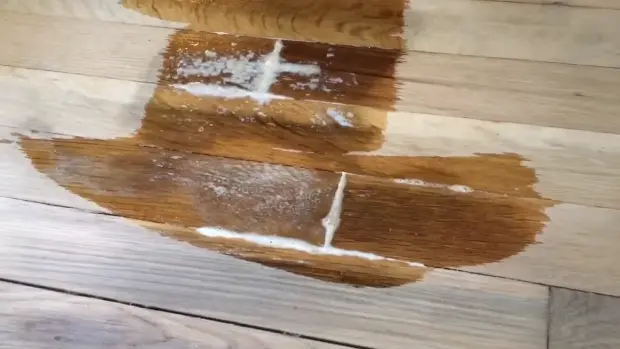
Cat pee can penetrate deeply into the crevices, causing warping and leaving unpleasant odors that linger for an extended period. Hardwood floors are porous and absorbent, allowing cat urine to soak deep into the wood fibers. When this happens, removing the odor and stain completely can be challenging.
Cat urine contains a high concentration of urea, which breaks down into ammonia over time. The ammonia in cat pee creates an unpleasant smell that lingers long after the initial accident occurs.
As cat urine soaked into hardwood floors attracts bacteria that produce more odor-causing compounds. This process makes eliminating the smell even more difficult as it becomes embedded deeper within the wood’s surface.
Tackle Cat Urine on Hardwood Floors: Apply Gentle Solutions
Cleaning cat urine from hardwood floors can be daunting, but it is not impossible. Start by using absorbent materials to remove as much urine as possible.
Then, a cleaning solution should be applied that effectively removes the stain and odor. It is important to note that harsh chemicals or cleaners can damage the hardwood floor’s finish, so it is best to stick with gentle solutions such as vinegar and water.
While there are many theories on how to clean cat urine from hardwood floors, there is no one definitive answer. Each situation may require a different approach based on the severity of the stain and odor.
By following the steps mentioned above and investigating different methods, you can successfully remove cat urine from your hardwood floors without causing any further damage.

